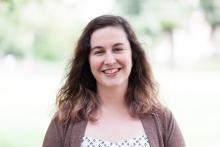Lauren Poyer joined the faculty this fall. She is a PhD candidate in Scandinavian Studies at the University of Wisconsin-Madison. Lauren is teaching Norwegian and Scandinavian Mythology this quarter. To get to know her a little better graduate student Connie Amundson posed a few questions.
Q: What drew you to studying your medieval nordic subjects of folklore and mythology?
A: I came to medieval Scandinavia through the language, in one sense. I started learning Icelandic on a lark in high school because I liked how it sounded. I had no intention of using the language to talk with other people, I just wanted to be able to listen and speak and understand on my own in my room with my headphones on. But what started as an intensely personal part of my life that has, ironically, led me to become far more open of a person than I used to be. Learning Icelandic—and then Old Norse—was my primary motivation for studying abroad, for getting a part-time job, even for going to graduate school, and these choices led me to meet new people and make new friends and learn new things and set new goals for myself. I feel like I am still on an upward trajectory of discovery. Medieval Nordic folklore and mythology, for example, are relatively new interests of mine that I have developed over the last two or three years. Pursuing these interests has made me feel more well-rounded as a scholar and has given me new tools for helping others to learn and discover and grow.
Q: What or who is your favorite myth, saga, or god/goddess and why?
A: Oh gee. I’m nervous to answer; people have such strong opinions about these things! May I tell you an anecdote instead? Last summer, the summer of 2017, I spent about a month in Copenhagen at a manuscript workshop hosted by the Arnamagnæan Institute, and we went on a bus excursion one Saturday. I distinctly remember not looking at the schedule, showing up early in the morning to the bus stop, and taking a bleary-eyed bus ride to...somewhere. The organizers dumped us out onto a field with some scattered farmhouses in what felt like the middle of nowhere. We all crowded into this tiny visitor center with cookbooks and bracelets and a stuffed raven on a shelf, only for me to learn that we were at Lejre. That might not mean much to most people, but Lejre is the assumed real-life inspiration for King Hrothgar’s hall Heorot in Beowulf. We have found evidence of some enormous feasting halls that date to the early Viking Age, as well as some significant bog depositions of gold and other precious goods. I sat outside and ate a snack by Grendel’s mere. That experience ranks very high in my list of favorite encounters with medieval Scandinavia.
Q: What do you most enjoy about teaching. Why?
A: I have developed a habit of weaving in between desks to eavesdrop on small-group discussion. This helps me get a sense of what students are struggling with—or succeeding at—and clues me in on how to incorporate their impressions and conclusions into my next portion of lecture. Students are routinely unnerved the first few times I walk by their desks, I assume because they aren’t very used to having an instructor in a topics course “break the fourth wall,” so to speak, but by Week 2 or so they come to expect it, and actually wait for me to come by so they can ask me questions and bounce ideas off of me. That’s what I enjoy most about teaching so far, being a wandering sounding board. I’m a moving target!
Q: How do you like to teach?
A: I like to teach well—or at to least try to! I have recently been working to structure my courses around evidence-based learning techniques, which is a more hands-on approach to teaching than the approach many instructors used just a decade or two ago. Evidence-based learning means that all the active learning is in the hands of the students and that the instructor serves more as a resource than as a didact. In my topics courses, this means punctuating my lectures with a lot of break-out small-group discussions. In my language courses, evidence-based learning looks like instant application. I demonstrate how to use a new word or phrase, and then the students immediately turn around and practice it with each other. Students are always applying what they learn so that their knowledge becomes actively accessible and functional, rather than just remaining passively absorbed and stored in some dark corner of their mind.
Q: What about Seattle have you enjoyed so far?
A: I haven’t had much of a chance to enjoy Seattle at all yet, to be honest. My partner and I moved here in July, we were traveling in Iceland for the month of August, and in September I sequestered myself in my office to prepare for teaching. And we spend every free day I have outside of Seattle, hiking. So that’s my favorite part of Seattle so far: the Cascades. My partner and I have spent several weekends now roaming around the mountains. In mid-September we went to Wallace Falls, which was stunning.
